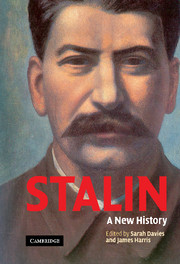Book contents
- Frontmatter
- Contents
- Notes on contributors
- Preface
- A note on transliteration
- Glossary
- 1 Joseph Stalin: power and ideas
- 2 Stalin as Georgian: the formative years
- 3 Stalin as Commissar for Nationality Affairs, 1918–1922
- 4 Stalin as General Secretary: the appointments process and the nature of Stalin's power
- 5 Stalin as Prime Minister: power and the Politburo
- 6 Stalin as dictator: the personalisation of power
- 7 Stalin as economic policy-maker: Soviet agriculture, 1931–1936
- 8 Stalin as foreign policy-maker: avoiding war, 1927–1953
- 9 Stalin as Marxist: the Western roots of Stalin's russification of Marxism
- 10 Stalin as Bolshevik romantic: ideology and mobilisation, 1917–1939
- 11 Stalin as patron of cinema: creating Soviet mass culture, 1932–1936
- 12 Stalin as producer: the Moscow show trials and the construction of mortal threats
- 13 Stalin as symbol: a case study of the personality cult and its construction
- 14 Stalin as the coryphaeus of science: ideology and knowledge in the post-war years
- Index
1 - Joseph Stalin: power and ideas
Published online by Cambridge University Press: 24 November 2009
- Frontmatter
- Contents
- Notes on contributors
- Preface
- A note on transliteration
- Glossary
- 1 Joseph Stalin: power and ideas
- 2 Stalin as Georgian: the formative years
- 3 Stalin as Commissar for Nationality Affairs, 1918–1922
- 4 Stalin as General Secretary: the appointments process and the nature of Stalin's power
- 5 Stalin as Prime Minister: power and the Politburo
- 6 Stalin as dictator: the personalisation of power
- 7 Stalin as economic policy-maker: Soviet agriculture, 1931–1936
- 8 Stalin as foreign policy-maker: avoiding war, 1927–1953
- 9 Stalin as Marxist: the Western roots of Stalin's russification of Marxism
- 10 Stalin as Bolshevik romantic: ideology and mobilisation, 1917–1939
- 11 Stalin as patron of cinema: creating Soviet mass culture, 1932–1936
- 12 Stalin as producer: the Moscow show trials and the construction of mortal threats
- 13 Stalin as symbol: a case study of the personality cult and its construction
- 14 Stalin as the coryphaeus of science: ideology and knowledge in the post-war years
- Index
Summary
Stalin, like the other ‘evil dictators’ of the twentieth century, remains the subject of enduring public fascination. Academic attention, however, has shifted away from the study of ‘Great Men’, including Stalin, towards the little men and women, such as the now celebrated Stepan Podlubnyi, and towards Stalinist political culture more generally. Ironically this is at a time when we have unprecedented access to hitherto classified material on Stalin, the individual. The object of this volume is to reinvigorate scholarly interest in Stalin, his ideas, and the nature of his power. Although Stalin certainly did not single-handedly determine everything about the set of policies, practices, and ideas we have come to call Stalinism, it is now indisputable that in many respects his influence was decisive. A clearer understanding of his significance will allow more precise analysis of the origins and nature of Stalinism itself.
The contributors to the volume do not subscribe to any single ‘model’. Instead, they share a common agenda: to examine the new archival materials, as well as the old, with the aim of rethinking some of the stereotypes and assumptions about Stalin that have accumulated in the historiography. The vast literature on Stalin is of varying quality, including journalistic speculations, sensationalist potboilers, and political diatribes, as well as the important studies by Isaac Deutscher, Robert Tucker, and others. Much of the work to date has been affected by both limited access to primary sources and the unusually intense politicisation of the field of Soviet studies.
- Type
- Chapter
- Information
- StalinA New History, pp. 1 - 17Publisher: Cambridge University PressPrint publication year: 2005
- 1
- Cited by



